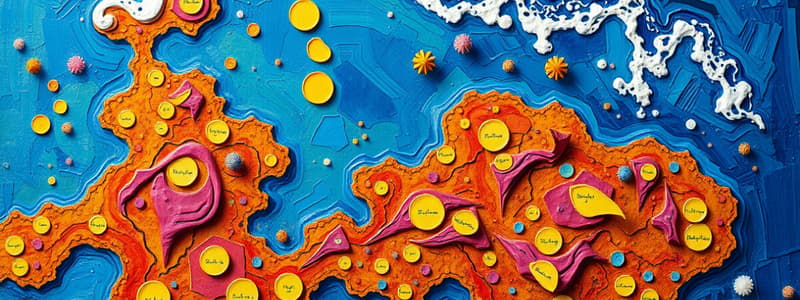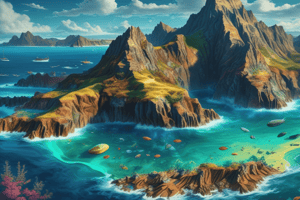Podcast
Questions and Answers
What is an abyssal plain?
What is an abyssal plain?
What does a continental shelf refer to?
What does a continental shelf refer to?
What defines a continental slope?
What defines a continental slope?
It is the area between the continental shelf and the continental rise.
What is a mid-ocean ridge?
What is a mid-ocean ridge?
Signup and view all the answers
Define a seamount.
Define a seamount.
Signup and view all the answers
What is the continental rise?
What is the continental rise?
Signup and view all the answers
What is an ocean trench?
What is an ocean trench?
Signup and view all the answers
What forms a volcanic island?
What forms a volcanic island?
Signup and view all the answers
What is sonar?
What is sonar?
Signup and view all the answers
Define a rift valley.
Define a rift valley.
Signup and view all the answers
What is a guyot?
What is a guyot?
Signup and view all the answers
What defines the Pacific Ocean?
What defines the Pacific Ocean?
Signup and view all the answers
What is the Atlantic Ocean?
What is the Atlantic Ocean?
Signup and view all the answers
Where is the Indian Ocean located?
Where is the Indian Ocean located?
Signup and view all the answers
What characterizes the Arctic Ocean?
What characterizes the Arctic Ocean?
Signup and view all the answers
Describe the Southern Ocean.
Describe the Southern Ocean.
Signup and view all the answers
What does salinity refer to?
What does salinity refer to?
Signup and view all the answers
Study Notes
Ocean Floor Topography Features
-
Abyssal Plain: Flat parts of deep-ocean basins, primarily composed of mud and organic remains.
-
Continental Shelf: Area between shoreline and continental slope; features a gradual underwater extension of the continent.
-
Continental Slope: Steep region found between the continental shelf and continental rise.
-
Mid-Ocean Ridge: Volcanic mountain chain on the ocean floor where oceanic crust is formed as tectonic plates pull apart.
-
Seamount: Submerged volcanic mountains at least 1,000 meters high, rising from the ocean floor.
-
Continental Rise: Found at the base of the continental slope; consists of large sediment piles between the slope and abyssal plain.
-
Ocean Trench: Deep cracks in the ocean floor formed at subduction zones, where one tectonic plate is pushed below another.
-
Volcanic Island: Created when a seamount rises above sea level, forming land above water.
-
Sonar: A technology for detecting underwater objects and measuring depth through sound pulses, crucial for mapping ocean floors.
-
Rift Valley: Long, narrow depressions formed by the separation of continental crust at divergent boundaries.
-
Guyot: A flat-topped seamount that has been eroded when originally above sea level, resulting from volcanic activity.
Major Oceans
-
Pacific Ocean: The largest and deepest ocean, bordering eastern Asia, northeastern Australia, Antarctic, and western parts of North and South America.
-
Atlantic Ocean: Second largest, covering half the size of the Pacific; borders western Europe, western Africa, Antarctica, and eastern North and South America.
-
Indian Ocean: The third largest ocean, located between Africa and Australia.
-
Arctic Ocean: The smallest and shallowest ocean, situated in the Northern Hemisphere mostly within the Arctic region.
-
Southern Ocean: The fourth largest ocean, extending from Antarctica to 60 degrees south latitude.
Salinity
- Represents the total concentration of dissolved salts in water, essential for determining ocean water's saltiness.
- Average ocean water contains about 35 grams of salts per kilogram, equivalent to 35 parts per thousand.
Studying That Suits You
Use AI to generate personalized quizzes and flashcards to suit your learning preferences.
Description
Explore essential vocabulary related to ocean floor topography with these flashcards. Each card features a key term along with its definition, helping you understand various underwater features. Perfect for oceanography students or anyone interested in marine science.




